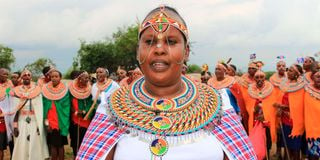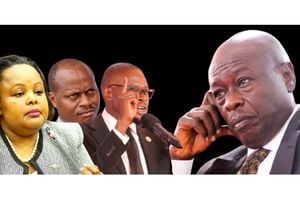The unlikely peacemaker: Christine Leakono's triumph over tribal patriarchy

Christine Letunta, the Loosuk Ward Administrator speaking to Nation.Africa on August 20, 2024 in Loosuk, Samburu County. She spoke on the pain of being a woman leader in a banditry stricken area.
What you need to know:
- Christine Leakono became the first female ward administrator in Samburu County, overcoming initial rejection from her patriarchal community.
- Despite facing skepticism and security challenges in a banditry-prone area, she proved her leadership capabilities and gained acceptance.
- She spearheaded innovative initiatives, including a pasture production project involving 1,500 women, which simultaneously tackled banditry and empowered local women economically.
The air is thick with tension as Christine Letunta Leakono stands before a group of 500 Morans, warriors from the Samburu and Pokot communities. The scorching sun beats down on the gathering, but Christine's resolve remains unshaken. With a steady voice that belies her inner turmoil, she addresses the crowd: "I am not speaking to you as a woman, but as a leader." The warriors, initially sceptical, begin to listen.
This scene, unfolding in the heart of Loosuk, Samburu County, encapsulates Christine’s remarkable journey. In a region plagued by banditry and deeply entrenched patriarchal norms, she has emerged as a beacon of change, challenging societal expectations and paving the way for women's leadership.
Rejected
Flashback to 2013, a year etched indelibly in Christine's memory. It marked a pivotal moment when she secured a position as ward administrator in the newly established Samburu County Government. The significance of this appointment cannot be overstated in a community where women in influential roles were virtually unheard of.
"A lot of people in my community had difficulties accepting me as the ward administrator," Christine recalls, her voice tinged with a mixture of pride and lingering disbelief.
"I was rejected by the community. They said that it would be hard for me to be a leader and cope as a woman in an area that had serious insecurity issues."
The challenges were manifold. Loosuk, Christine's area of responsibility, was notorious for rampant cases of banditry, creating a volatile environment that many believed unsuitable for female leadership. Yet, her determination remained unshakeable.
"I was the talk of the town," she says, a hint of a smile playing on her lips. "Many people wondered how I would perform in my job. They had a lot of doubts in me. I had to work extra hard to prove them wrong."
Her role as ward administrator was multifaceted and demanding. She was tasked with managing and coordinating county government projects in the ward while serving as the representative of the devolved unit. The pressure to excel was immense, but she was more than equal to the task.
"I worked very hard, and the people were impressed with my job," she states proudly. "After a while, the community accepted and learned to live with me. I am happy that the people have now realised that a woman is also equal to the task and has what it takes to lead."
Over her ten-year tenure, her impact extended far beyond her official duties. Recognising the untapped potential of women in her community, she embarked on a mission to empower them both economically and in leadership roles. Her efforts in resource mobilisation for women's economic empowerment and providing sanitary towels for schoolgirls have been transformative.
Perhaps her most significant contribution has been her innovative approach to addressing the region's persistent banditry problem. Understanding that lack of pasture was a primary driver of conflict, she spearheaded an initiative that would change the landscape of Loosuk.
"Currently, Christine and more than 1,500 women in the area are, through the Loosuk Farmers Association, engaged in pasture production," explains Philip Lerno, the Loosuk senior chief and a HeforShe champion.
"We produce the pasture and store it for use during the dry season. We currently have a store that holds about 30,000 bales of hay."
This initiative has had a dual impact; providing an economic lifeline for women while simultaneously reducing instances of banditry.
"When there is drought, we sell the pasture at a fee, which has helped the women to make money. It has also helped to bring cases of banditry down," Christine notes with satisfaction.
Plight of women, girls
The impact of her leadership extends beyond her immediate sphere of influence. Mercy Leinkupal, a member of one of the women's groups in Loosuk, attests to the transformative effect of Christine's work.
"Women are now engaged in pasture production, which has helped to generate income to start other businesses," Mercy says, her eyes shining with newfound hope.
"We can now afford to have our own money, which was very hard before. A woman leader will always mind about the plight of women and girls in the community."
Philip Lerno echoes this sentiment, emphasising the importance of inclusive leadership.
"It is very important to involve women in our community in leadership. They form part of the majority and, therefore, it will be unfair to side-line them. To ensure inclusive development, women need to be at the decision-making table," he asserts.
As Christine reflects on her journey, she offers words of wisdom to aspiring female leaders: "If you aspire to be a leader, you must have self-drive. If you do not have self-drive, please do not go for that position or seat. If you are seeking it for money, then you are in the wrong place. That should not be your motivation."
Christine's own educational background serves as a testament to her commitment to personal growth. She holds a degree in Leadership and Management from St Paul University, a diploma in Human Resources from the University of Nairobi, and a certificate in Front Office from Utalii College.
As the sun sets over Loosuk, casting long shadows across the landscape, her story stands as a beacon of hope and change. In a region once defined by conflict and gender inequality, her leadership has sown the seeds of transformation.
“The pastures are greener, the community more united, and the future brighter for the women and girls who dare to dream of leadership,” she asserts.





